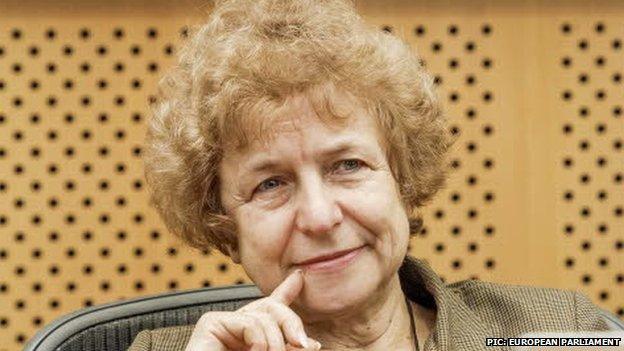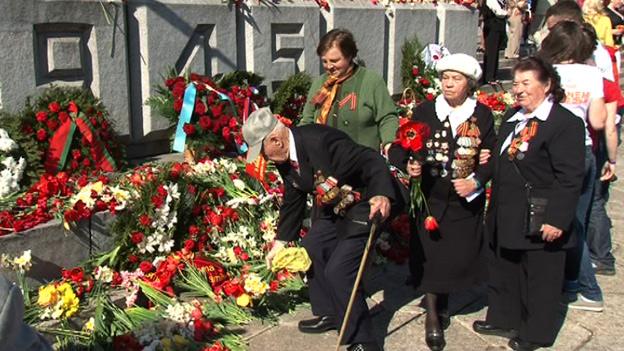'Russian agent' row hits Latvia election
- Published

Tatjana Zdanoka is already a veteran of EU politics
The Ukraine crisis has not only caused a rift between the EU and Russia - it's also deepening divisions in the European Parliament.
Latvian MEP Tatjana Zdanoka has been placed under investigation by Latvia's security authorities, accused of being an agent of influence for Russia. She is due to return to Latvia for questioning.
The allegations come from fellow Latvian MEP Karlis Sadurskis, who has filed a complaint with Latvian state prosecutors. He accuses Ms Zdanoka of involvement with a Russian organisation which, he claims, aims to re-establish the Soviet Union, and so undermine Latvian national independence.
Ms Zdanoka, who is running for a third term as MEP, denies the allegations, calling them an attempt by a political rival to win popularity.
But Ms Zdanoka is a controversial personality. She was born in Riga to a Russian-speaking family while Latvia was part of the Soviet Union. During the 1980s she became one of the leaders of a political organisation which opposed Latvian independence from the USSR.
She was later banned from national politics because of her membership of the Communist Party after Latvia became independent in 1991.
More recently she has called for closer relations with Moscow. And on 16 March she acted as an observer to Crimea's referendum, which critics see as proof that she backs Russia's actions there.
The referendum was held in defiance of Kiev and was condemned internationally. Moscow said it legitimised the return of Crimea to Russia, from Ukraine.

Many Red Army veterans in Latvia feel nostalgic about the Soviet Union
Russians in EU
Latvia suffered enormously under 20th-Century Soviet occupation. So the sight of Russian troops in Crimea and massed near Ukraine's border has alarmed many Latvians. As a result, any stance seen as supportive of the Kremlin is unpopular in mainstream Latvian society - often interpreted as a betrayal of national independence.
The row between the two MEPs is symptomatic of the division within Latvia itself. The country is split between ethnic Latvians and Russian-speakers who make up more than a third of the population. While many Russian-speakers are well-integrated, some complain of discrimination - an issue about which Tatjana Zdanoka is outspoken.
Latvia has the largest Russian-speaking population in the European Union. But there is no indication that this is a pro-Kremlin fifth column, yearning to undermine the EU. Politically there are no calls for Latvia to leave the EU.
And ironically the party predicted to get the most votes in May's European Parliament elections is not one of the pro-Western blocs popular with ethnic Latvians - but rather Harmony Centre, which has links with President Vladimir Putin's United Russia and is traditionally supported by Latvia's Russian speakers.